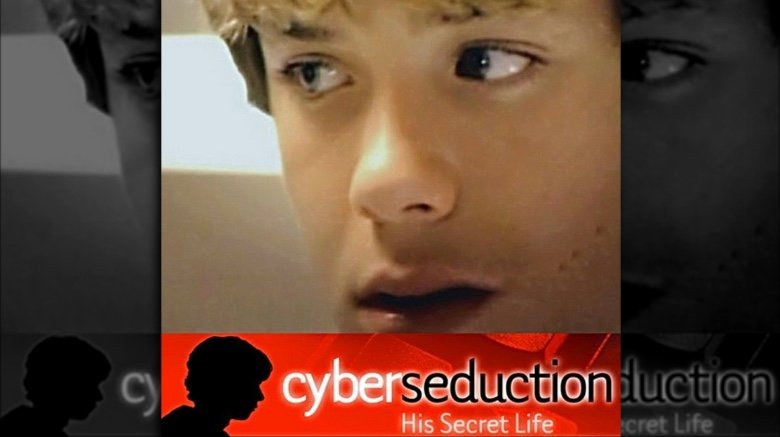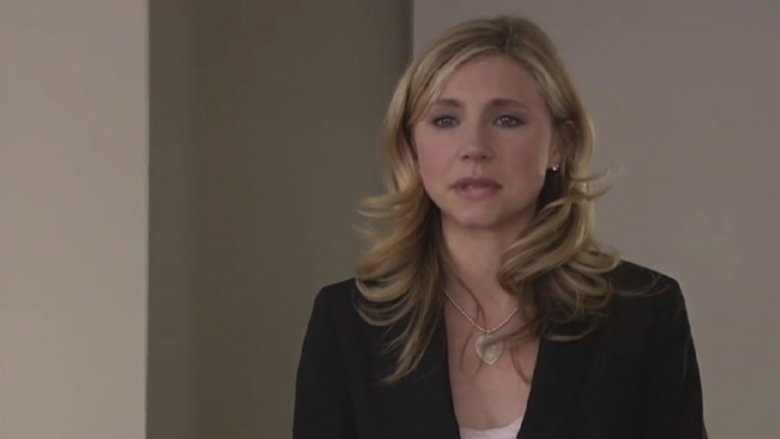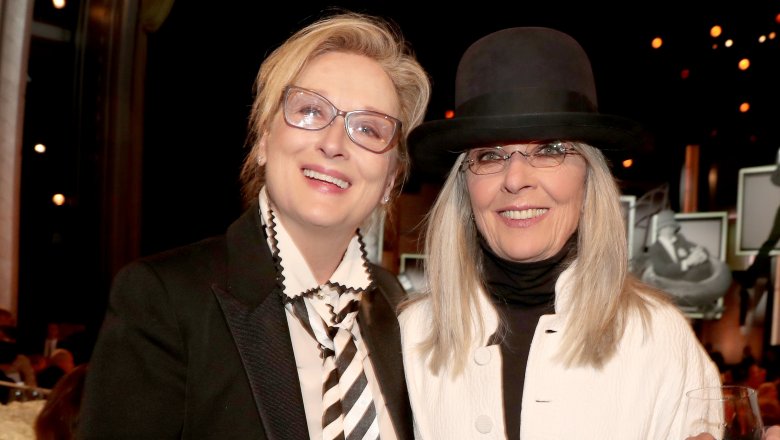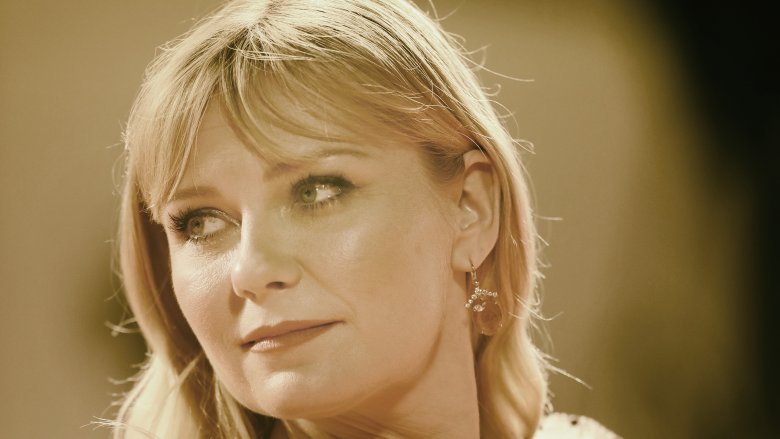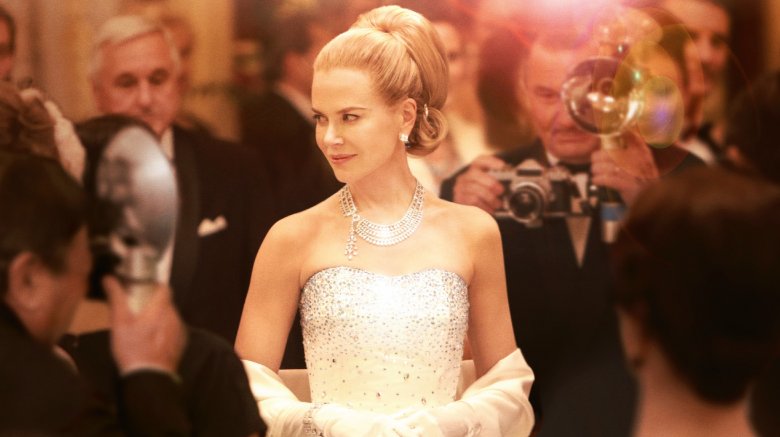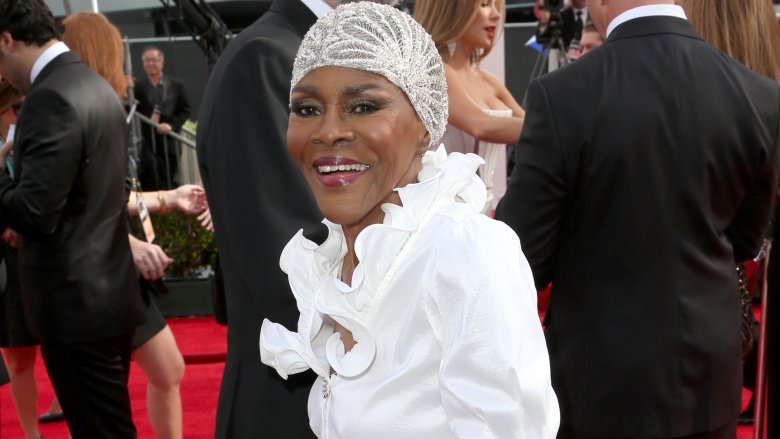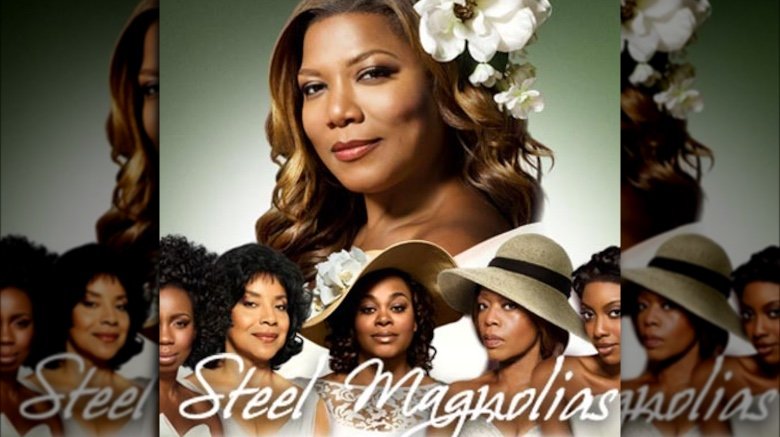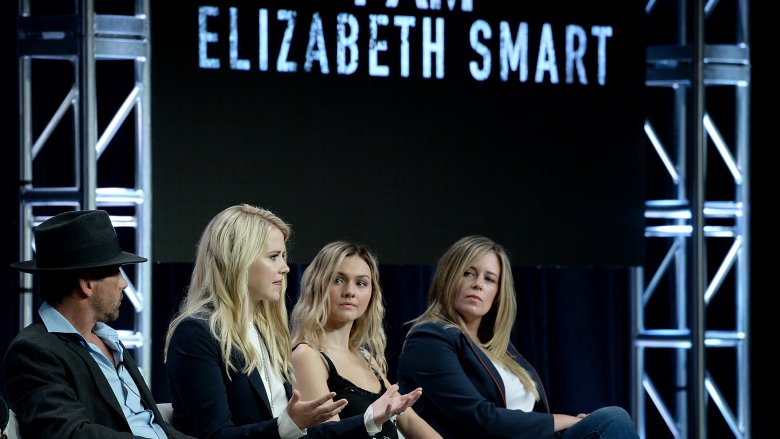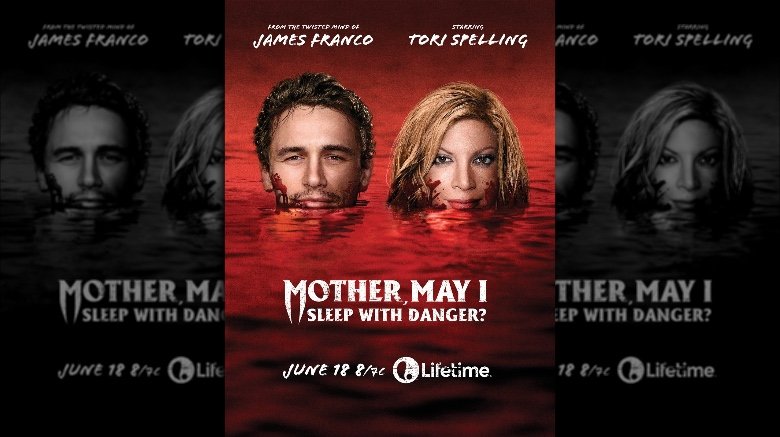The Untold Truth Of Lifetime Movies
By now, Lifetime movies have become something of a national treasure, with an enduring legacy that resides somewhere between Jerry Springer-like camp and ABC After School Special-like melodrama. By turns shocking, tear-jerking, unhinged, and hilariously overwrought, Lifetime programming turned tabloid fodder into a beloved pastime throughout the '80s and '90s.
Women scorned, punk rock teens in jeopardy, homicidal maniacs on the loose, home-wrecking femme fatales, mid-life crises turned pathological, Dynasty-like personality ("poisonality?") clashes, high school rivalries that turned into true crime bloodbaths ... the channel had it all. And even though many of its early shows were predictably critically panned, viewers adored them.
In the 2000s, Lifetime changed their tune, started making critically acclaimed films, and eventually garnered a wealth of prestigious nominations. That's exactly why the evolution of the channel is so singularly fascinating and unique: rarely has a television entity, especially one that started out as bland daytime talk TV, demonstrated such astonishing versatility. Read on to find out more about the channel that went from being America's sweetheart of guilty pleasures to being the stuff that Emmy Award statuettes are made of.
Early viewers mistook Lifetime for "religious programming"
It's rather amusing that Lifetime, a channel famous for its myriad tabloid-esque enjoyments, was initially mistaken for religious programming in its infancy. According to South Carolina's Herald-Journal, the channel got off to a "miserable start, losing a reported $36 million in its first two years" — partially because viewers associated it with church broadcasting, for whatever reason. In truth, however, Lifetime was far from militantly pious. In fact, the network even gave figures like plucky sex therapist Dr. Ruth Westheimer (hardly an ambassador of chaste family values by hardcore Evangelical standards) their own syndicated talk shows.
Westheimer was actually one of Lifetime's biggest assets, even in the network's early days of struggle; as Entertainment Weekly explains it, she was responsible for some of the channel's highest ratings, a standing she maintained until 1991 — even though the network was said to have been initially "wary" of her frank, graphic, and exuberant approach to sex.
A lukewarm reception to Lifetime led to sensationalist melodrama
With ratings plummeting and television doom looming on the horizon in the late 1980s, Lifetime's powers-that-be knew they had to do something — so they drastically revamped their image, with a decidedly lurid and melodramatic spin as a guiding principle.
In 1990, the channel's own new "lifetime" launched in the form of the made-for-TV thriller Memories of Murder, which starred Nancy Allen of RoboCop, Carrie, and Dressed to Kill fame as an amnesiac housewife who has no clue (because of her temporary brain damage) that she's being stalked by a lunatic. The cheesy thriller was an instant success with viewers, critical reception notwithstanding. From then on, the hits — like the famous Mother, May I Sleep With Danger, starring Beverly Hills, 90210's Tori Spelling, and the decidedly NSFW-sounding Co-Ed Call Girl, also starring Tori Spelling — just kept coming.
Fun fact: The former beloved badsterpiece was remade in 2016, but with a "vampire twist."
Women's groups saved Lifetime from being cut
Interestingly enough, and despite the channel's cherished tabloid-esqueness, Lifetime's viewers also took its programming seriously. The network had, after all, branded itself as "Television for Women," which ultimately gave it something important to live up to. And contrary to popular belief, the programs weren't by any means all about melodrama. Themes like discordant parent-child dynamics, marital problems, and feminist causes also resonated seriously with viewers — and that's part of the reason that Telecommunications Inc.'s mid-1990s proposal to drop the channel met with such vehement opposition, according to a 1996 report in The New York Times.
Though the company's decision was primarily mercenary, rather than specifically anti-feminist — the goal was apparently to "make room" for Rupert Murdoch's "all news" Fox Inc. channel — many female viewers saw the proposal differently. One of those people was Colorado Democratic Representative Patricia Schroeder, who told The New York Times, ”Women kind of feel like they're being rolled over so that the guys who run these companies can make more money.” Protests from various women's groups ensued, and the channel stayed put.
The more lurid and dramatic the topic, the better for Lifetime
By the time the '90s rolled around, Lifetime's status as one of television's most beloved "guilty pleasures" was well-established. As The Washington Post put it: "The more devastating the movie topic, the better for business: Teen deaths, bullying, murder, prostitution, nannies kidnapping babies. The horrifying (but captivating) plots became a running joke within the industry, but the viewers couldn't get enough."
Indeed, films like My Stepson, My Lover, Another Woman's Husband, and the bluntly-named Daddy, based on one of Danielle Steel's schmaltzy supermarket novels, went on to take top honors in Lifetime's lurid-but-irresistible hierarchy.
The network's great early days also ushered in Secret Sins of the Father, the fabulously prurient story of a father and son (Lloyd and Beau Bridges, respectively) who are sleeping with the same woman; She Woke up Pregnant, which featured iconic Wonder Woman Lynda Carter; and A Woman Scorned, starring Meredith Baxter (aka the hippie mom in Family Ties) as the very "creatively" vengeful wronged party whose husband leaves her for a younger woman.
Lifetime eventually ditched those worst case scenario storylines
Lifetime's "guilty pleasure" movies continued to be a hit with their fanbase well into the '90s. By the latter 'part of the decade, the channel had become the place for the most sensational of movies. " 'Teens in jeopardy' was an incredibly successful genre for us," Arturo Interian, vice president of Lifetime original movies, detailed to The Washington Post in 2015. "We would literally sit around a room and talk about all the horrible things that could happen to teens, or what teens could do." Although such films did bode well for the company at that time, Lifetime began 86ing the cringe-worthy titles, overly dramatic tropes, and even those beloved worst case scenario storylines.
But, if this genre was working so well for the channel, why did Lifetime set about revamping their image once again? Tanya Lopez, senior vice president of original film programming, told the publication, "I think the goal was to make the movies more relevant. Make them feel more contemporary. Make them build a new audience." She continued, saying, "Not just keep the audience that we had... and we really had to turn this cruise ship around."
Lifetime drastically revamped their "guilty pleasures" image in 2009
By the early 2000s, Lifetime had begun to branch out into increasingly "serious" programming, and much of it was even good enough to garner major accolades. In 2006, the channel received an Emmy nomination for Why I Wore Lipstick to My Mastectomy, a movie based on writer and activist Geralyn Lucas' memoir about surviving breast cancer.
By 2009, when the channel was taken over by A&E, it had received enough critical acclaim to inspire executives to begin a concerted effort to push programming into territory that wasn't primarily defined by melodrama — even though the delightful old-school cheese that we all love hasn't entirely gone, thankfully.
In 2008, The Memory Keeper's Daughter, about a father who gives his newborn daughter away because she has Down Syndrome, received enthusiastic reviews and a Primetime Emmy Award nomination, as did 2009's Prayers for Bobby, about a gay man who commits suicide because his mother (Sigourney Weaver) won't accept his sexuality. The latter also garnered Golden Globe, Screen Actors Guild, and Producers Guild of America Award nominations, and nabbed the GLADD Media Award in 2010, to boot.
The Lifetime channel challenges sexist industry standards
If Lifetime has gone from cheese to acclaim since its inception, there's a great reason for it: the vast number of gifted female directors the channel has gone out of its way to hire over the years. Even in this day and age, it's no secret that the film industry is in many ways notoriously sexist, but even back in the pre-Harvey Weinstein exposé era, the channel was determined to put much of its fare into the hands of women.
Actress Diane Keaton made her directorial debut on Lifetime in the form of Wildflower, one of the channel's first "cerebral" movies, and actress Angela Basset directed Whitney (as in Whitney Houston), one of the channel's most successful biopics. Other star directors to work on movies for Lifetime have included Mary Harron and Agnieszka Holland. That's a pretty impressive and intellectually impressive lineup for a channel that started out with tabloid-like works.
Many legendary actors got their start in Lifetime movies
The number of now-famous stars who got their start — or at least made burgeoning or mid-career appearances — in Lifetime movies might really surprise some people, too. As pointed out by Glamour, the then-largely unknown Reese Witherspoon, for example, co-starred with a pre-True Romance Patricia Arquette in the aforementioned Wildflower, a story about the relationship between a girl and her deaf friend.
A not yet Twilight-famous Kristen Stewart tore up the screen in 2004's Speak, a story about a high school student trying to cope with the aftermath of sexual assault. In 2004, before he broke ground with High School Musical, Zac Efron appeared in Miracle Run, the gripping story of two autistic brothers. And in 1998, Kirsten Dunst, then still primarily famous for playing child vampire Claudia in Interview With the Vampire, starred in Lifetime favorite Fifteen and Pregnant, playing the proverbial young mother in trouble.
Tatiana Maslany of Orphan Black also commanded the Lifetime screen in 2005's Dawn Anna, a film about the Columbine High School massacre. And Nina Dobrev of The Vampire Diaries starred in 2007's Too Young to Marry, the tale of an ardent and impetuous teenaged couple who are determined to get hitched, even though everyone else thinks (correctly) that it's a terrible idea.
Big stars still make appearances on Lifetime
While you may think of Lifetime as a Mickey Mouse Club of sorts, the channel isn't just a starting point for actors hoping to get recognized. In fact, Lifetime has lured some stars who don't need any help getting noticed.
In 2015, hilariously funny Kristen Wiig and Will Ferrell starred in the totally unfunny Lifetime film A Deadly Adoption. Perhaps due to the campy title and the fact that the lead actors are best known for their comedic work, many thought the movie was satirical. However, Wiig told Vulture that it "wasn't a parody." She continued, saying, "I think people assumed it was [a comedy] because Will and I were in it, but it wasn't."
Lifetime has also served as a plan B for A-list actors. In 2015, Academy Award-winning actress Nicole Kidman starred in the biopic Grace of Monaco. Due to behind-the-scenes drama and some seriously bad early reviews, TV Guide highlighted how this film went from "Oscar hopeful to Lifetime movie." Sure, Lifetime isn't always the goal for actors, but it's not a bad place to end up.
Lifetime went from weepy schmaltz to distinguished award-nominated works
The number of Emmy Award nominations Lifetime has racked up over the years is nothing short of impressive. Actress Thora Birch, known for her roles in American Beauty and Ghost World, was nominated for her role in Lifetime's 2003 TV movie Homeless to Harvard: The Liz Murray Story.
As previously highlighted, Why I Wore Lipstick to My Mastectomy received an Emmy nom in 2007. That same year, iconic actress Gena Rowlands was nominated for What if God Were the Sun. In 2009, Shirley MacLaine was nominated for the biopic Coco Chanel. Later, in 2012, the Lifetime network received major accolades for Steel Magnolias, and 2014 saw A Trip to Bountiful get nominated for outstanding television movie. Cicely Tyson, the film's lead actress, also received a personal nomination for her brilliant performance. This list goes on and on. By 2017, the channel accrued a whopping 23 Emmy nominations.
Steel Magnolias changed everything for Lifetime
Steel Magnolias was far from the first Lifetime film to earn an Emmy nomination, of course, but the movie served as the channel's catalyst for change. "I think Steel Magnolias was when we realized we had an audience out there who wanted that kind of quality programming that was for them," Lisa Hamilton Daly, Lifetime's vice president of original movies, told The Washington Post. According to the publication, an incredible 6.5 million people tuned into the channel to watch the movie. "It was a big energizing moment for all of us to think like, okay, we can get that audience there and we can engage them," Daly added.
The remake starring lead actress Queen Latifah and an all-black supporting cast not only garnered nominations from the TV academy, but it also earned some stellar reviews. The film's success encouraged Lifetime to create more of their own unique movies as well as take on projects they thought would elicit a similar response to that of Steel Magnolias.
Kidnapping victim Elizabeth Smart produced and narrated her own Lifetime film
One of Lifetime's most successful and acclaimed films was 2017's I Am Elizabeth Smart, the graphically rendered story of Elizabeth Smart's bloodcurdling — and, by now internationally well-known — 2002 abduction and rescue. The film received almost unanimously rave reviews for its writing and acting, but it was particularly notable because Smart herself both co-produced it and narrated it. The movie, not un-coincidentally, aired on the 15th anniversary of Smart's abduction.
And although she later said that collaborating on the project was significantly traumatic (and that seeing actor Skeet Ulrich so convincingly done up as her kidnapper was particularly unnerving), Smart made it clear that she didn't regret the experience.
Lifetime's cast and crew were almost equally moved by participating in the experience, as were many critics. As Variety put it, "I Am Elizabeth Smart is ... a remarkable Lifetime movie. Much like Smart herself, it is restrained, unpretentious, and direct. And to the cast and crew's credit, nothing about it diminishes Smart's ordeal or plays it up for manufactured horrors; it simply is, which is plenty horrible enough."
It's beginning to look a lot like Lifetime
For many, nothing says Christmas quite like Lifetime. In 2018, the network put even more emphasis on their holiday programming, which is aptly called "It's A Wonderful Lifetime." That year, the channel introduced a whopping 23 films. "By stacking our originals with beloved stars from some of the most iconic television shows we grew up with, we are tapping into the nostalgic feelings of familiarity and comfort that everyone wants for the holidays," Tanya Lopez, executive vice president of original film programming at Lifetime, told People. Of the 23 films, only nine had been acquired and the other 14 were produced by the network.
Not one to be outdone by their own success, Lifetime announced plans to shatter their own holiday movie record yet again. As People reported in July 2019, the network revealed a 28-film lineup ahead of the holiday season. The "It's A Wonderful Lifetime" event begins on October 25 and continues through December 25, 2019. Clear those calendars.
Lifetime ultimately became a self-aware network
"Lifetime pioneered so many genres that ended up taking over television," Rob Sharenow, Lifetime's executive vice president and general manager, told BuzzFeed News in 2016. "The medical drama, we had that 20 years ago. The female cop drama, we had that back when no one was programming cable dramas."
Despite being a trailblazer, the network hasn't always received the credit it deserves. It's battled "an incredible unfair bias," Sharenow added. But it was his goal to change that. "I wanted Lifetime to be more in the bullseye of pop culture, first and foremost," he explained. "I really wanted to force the conversation about Lifetime into more of the mainstream pop culture, not in this Lifetime ghetto."
At the same time, Lifetime has also learned to lean into its campy image, which is evidenced by films like the aforementioned Mother, May I Sleep With Danger? "I think we are embracing the cultural impact of Lifetime movies upon generations, and not being embarrassed by it," Tanya Lopez, executive vice president of original film programming, told the publication. "What we're showing by doing these is, look where we were, and look where we are. It's much more entertaining."






